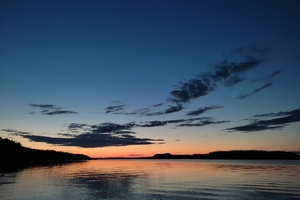Students and teachers of PetrSU in the expedition “Ladoga Skerries”
The annual complex scientific research expedition “Ladoga Skerries”, organized by the Institute of Lakes Science of the Russian Academy of Sciences, took place.
In 2021, in order to comprehensively study the resources of Lake Ladoga, scientists, graduate students, students and schoolchildren from 11 scientific and educational organizations of St. Petersburg, Moscow, Petrozavodsk, Vologda and Pushchino took part in the expedition.
The expedition was carried out in the National Park “Ladoga Skerries”, on the Pellotsari island, which made it possible to fully study the rich species diversity of the island’s flora and fauna, as well as the coastal territory and water area of the lake. The research was of a comprehensive nature and was aimed at a detailed study of the underwater ecosystems of various parts of Lake Ladoga with different depths. The state of benthic communities was also assessed and their daily migrations in the coastal and deep-water parts of the lake were studied, the composition of the ichthyofauna was studied, and geological surveys were carried out both on the territory of the island and on the bottom of the reservoir.
From PetrSU, the expedition was attended by undergraduate students “Aquatic Bioresources and Aquaculture” Elizaveta Spirova and Valery Kurganov under the guidance of Associate Professor, Deputy Head of the Department of Animal Science, Fish Farming, Agronomy and Land Management A.Yu. Volkova. As a result of the expedition, materials were collected on the ichthyofauna of Lake Ladoga in the area of Pellotsari Island. Also, students were able to study and apply in practice various equipment used in limnological research, participate in the collection of materials for the study of the benthic fauna of coastal and deep-water areas, assessing the state of the food supply and bottom landscapes of Lake Ladoga.
Traditionally, the purpose of this expedition is not only to collect materials for research, but also to attract students and schoolchildren to science, increase their interest in gaining knowledge about the world around them, and get acquainted with field work techniques. For this purpose, within the framework of the expedition, lectures and master classes are held for students and schoolchildren. This year, traditionally, lectures were held on the most pressing issues: “Fundamentals of Molecular Biology”, “Study of the bottom landscapes of Lake Ladoga”, “Environmental modeling”, “Chemistry around us” and others.
A.Yu. Volkova gave a lecture for schoolchildren and students “What is aquaculture and why it is important.” Conducting master classes for schoolchildren on the basics of ichthyological assessment, on the design and use of limnological equipment, on methods for obtaining and identifying benthos and zooplankton also allowed the children to immerse themselves in the fascinating world of biology of aquatic organisms.
Elizaveta Spirova, 3rd year student (“Aquatic biological resources and aquaculture”):
The expedition allowed us to see how field work is being conducted and samples are collected for further research. Collected materials for a term paper and, possibly, for a future diploma. We use the materials after processing to prepare the article and speak at the conference.
Valeria Kurganova, 3rd year student (“Aquatic Bioresources and Aquaculture”):
She gained useful experience in studying the daily migrations of amphipods, participated in surveying the lake bottom and ichthyological assessment of catches. I liked the master classes and lectures very much.
Deputy Head of the Department of Animal Science, Fish Farming, Agronomy and Land Management A.Yu. Volkova:
Participation in the expedition “Ladoga Skerries” in August 2021 is the first experience both for me and for the students of our department. Participation in the expedition undoubtedly gave very good results, allowed them to take part in real scientific research, learn how to collect samples and analyze them, master quantitative methods of accounting for food organisms. This is of great importance in increasing student interest in scientific research. Involving schoolchildren in such expeditionary projects also brings enormous benefits and allows increasing the prestige of natural science training areas.

